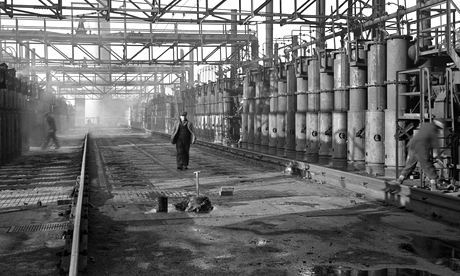
It has taken Richard Benson, author of the bestselling memoir The Farm, seven long years to complete his second book, and from the moment you begin reading, it's apparent why. A work of social history – The Valley tells the story of Benson's maternal family in the mining villages of the Dearne valley in South Yorkshire over the course of 100 years – this 500-page collection of stories could not be more meticulous or magically intimate if it tried.
How, the reader will wonder, has Benson pulled off this trick, taking us so deeply into the homes and hearts of people whose lives must have passed largely unrecorded? In his acknowledgments, he thanks his family for sharing their memories with him, and gives the usual roll call of local archives and newspapers. But this list doesn't even come close to explaining the miracle of his book, which has the exquisite, finely worked texture of petit point. The things he sees, and the things he understands! It's as if he is a medium. Sometimes, in a reverie of amazement, I would picture him running his hands over an old shawl or scarf, the better to encourage the words to flow, untrammelled and unexpurgated.
In truth, it would not be wholly surprising if Benson had the ability to contact the dead. On his mother's side, the women were well known in their communities for being endowed with certain powers. His great-grandmother, Annie, used to hold seances, while his grandmother, Winnie, spent her life watched over by a Gypsy girl she took to be her guardian angel; both were keen on herbs to treat illnesses (in old age, Winnie liked to attack her arthritis with nettle leaves, one kind of pain supposedly cancelling out another).
Benson treats these gifts as he treats everything in his book, taking them at face value just as they would have been by friends and neighbours at the time. Occasionally, he will punctuate his narrative with facts and figures: for instance, when the miners' strike gets under way in 1984. But in the main, he records his relatives' lives as they were lived, which is to say in a kind of bubble, a realm in which Doncaster has its excitements, and Skegness is exotic. He muffles the outside world – the pronouncements of the newspapers, the prime minister and even of Arthur Scargill – with the result that the reader comes to feel he is holding not a book of social history in his hands, but a fat and vivid novel.
The Valley begins shortly before the outbreak of the first world war when Annie marries Walter, a miner. Saved from a bullet by a button on his uniform, Walter returns from the trenches horribly injured, and though he is a good man, the violence he has seen and the pain he still feels sometimes find outward expression in the way he treats his elder daughter, Winnie: in the wrong mood, he will beat her bare back with the buckle of his belt. Winnie, however, loves her father deeply, and his abuse only instils in her a life-long masochism. If she is hard on those she loves, she is even harder on herself; the nettles pale into insignificance beside the other sacrifices she makes.
Winnie marries a man called the Juggler who lives a double life, spending his evenings working in variety, and their marriage is not always happy. In turn, her younger daughter Lynda makes two bad marriages, leaping unthinkingly from frying pan to fire, as people are wont to do when the house is too small, and money too scarce, until she finds someone kind and true. This is, I think, a great book about kindness, an unglamorous virtue that is often ignored by ambitious writers. How to be kind without seeming to be dispensing pity? How to receive kindness without losing face? When does pride shade into foolishness? These questions shadow Winnie Hollingworth almost as closely as her Gypsy girl.
I worry that I'm making the book sound mawkish. It isn't. The Valley is often upsetting – Benson makes you care about his characters, and you long for them to sort their muddles and misunderstandings out – but it is sobering, too, a chastening repository of some extremely uncomfortable truths when it comes to violence against women (a violence that is largely tolerated, even by other women), and the way middle-class institutions treat working-class people. I can't remember the last time I read a book that delineates quotidian poverty so plainly, or that captures so deftly the cadences of the Yorkshire dialect in all their contradictory glory – defensiveness, mithering and taciturnity concealing abiding love and, on occasion, troubling passion. Old customs and long-forgotten habits are used to great effect, enabling Benson to move on the years without resorting to creaking explanatory machinery; his handling of time is seamless.
As his story moved closer to my own era, I would sometimes feel winded by the things he brought back so casually: the curtains of every house in the street closed on the morning of a funeral (I remember this); the feeling that it was once the man of the house who determined its mood, and that this was somehow his right (ditto); the acknowledgment that it was necessary to walk "the long way round" if you wanted to get off with a boy (ahem). I would have liked some photographs dropped into the text, and a family tree to guide me. But these are tiny things, and the responsibility of his publisher in any case. The Valley is a masterpiece of empathy and good writing, and I hope that in months to come it will be on the receiving end of a great deal of reciprocal love.

